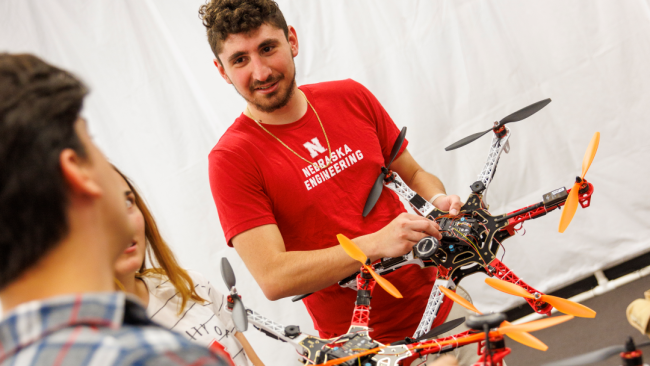You have /5 articles left.
Sign up for a free account or log in.

STEM CONNECT Scholar Santiago Giraldo discusses unmanned aerial vehicles at the University of Nebraska-Lincoln’s NIMBUS (Nebraska Intelligent MoBile Unmanned Systems) Lab in 2022. As a STEM CONNECT Scholar, Giraldo is part of a community of other students focused on STEM careers across three institutions.
University of Nebraska-Lincoln
In 2019, the University of Nebraska at Lincoln received a $3.5 million grant from the National Science Foundation to launch STEM CONNECT, a scholarship program aimed at supporting low-income students pursuing careers in science, technology, engineering and math.
Since the program launch, STEM CONNECT (Science, Technology, Engineering and Math Career Opportunities in Nebraska: Networks, Experiential learning, and Computational Thinking) has benefited local students across Nebraska attending UNL, Southeast Community College and Western Nebraska Community College by providing scholarships, community support, education and mentorship.
What’s the need: In Nebraska, around 22 percent of all occupations in 2018 were STEM, with the number of those occupations expected to grow 11 percent, seven percentage points greater than non-STEM jobs growth rate, according to a June 2022 report from the Nebraska Department of Labor. Of those occupations, 75 percent require a bachelor’s degree or higher.
To foster local development of talent nationally, NSF funds around 600 S-STEM awards, using H-1B visa money from foreign workers in technology-intensive sectors. An S-STEM program, STEM CONNECT promotes opportunities for low-income, high-achieving students to pursue a degree and career in STEM, with the goal of adding to the national STEM workforce.
“Lots of students with ability fall between the cracks because they can’t afford college or they work 25 to 30 hours a week,” explains Jim Lewis, the principal investigator for the STEM CONNECT grant.
UNL’s grant was developed in partnership with Southeast Community College and Western Nebraska Community College to promote talent across the state.
Eligibility: To be eligible, students must demonstrate a high level of financial need, commit to enrolling in a STEM degree with a focus on computer science or mathematics, and fit a residency requirement of the U.S. (citizen, national or refugee). Students enter the program in their first year at one of the participating institutions and can transfer from one of the colleges to UNL to finish a four-year degree if they choose.
Students selected as part of the program receive up to $8,000 a year in scholarships, as determined by their federal aid form.
Currently, UNL has 39 students in STEM CONNECT, SCC has 10 students and WNCC has 12. Of UNL’s scholars, many are underrepresented minorities, women, first-generation or nontraditional students, like parents.
Programming: Over the course of the program, UNL staff have learned that students need to be front-loaded with the tools for success to ensure they stay enrolled and are equipped to navigate higher education.
In their first term, STEM CONNECT scholars participate in a noncredit seminar course, which offers community support among peers along with professional skill development and academic success tips. The course is noncredit so students don’t have to pay for the hours, Lewis explains.
In subsequent semesters, scholars continue to meet regularly in bimonthly seminar meetings, which could feature a guest speaker, a visit to a local employer or a team-building activity like a math-themed escape room.
Students are also paired with a faculty mentor for professional and academic support and a peer mentor for personal encouragement. If needed, STEM CONNECT staff can also hire tutors for students to support them with specific academic help, as well.
The nature of a diverse, low-income cohort also means students are having problems unrelated to their academics that can affect their performance, says Rachel Funk, research scientist at the Center for Science, Mathematics and Computer Education at UNL. More recently, scholars have asked for more community-building opportunities, which Funk theorizes could be a result of the pandemic.
Looking ahead: The grant funding will end in September 2024, but UNL staff plan to apply for a no-cost, one-year extension to keep the program running through the fall of 2025.
The first cohort began in fall 2019 and will graduate 11 students across this spring and summer from UNL. At this stage, UNL is not recruiting first-years but focusing its attention on transfers from the community colleges and supporting them through internships, job hunting and beyond. The first STEM CONNECT transfers will graduate in December.
Get more content like this directly to your inbox every morning. Subscribe here.




